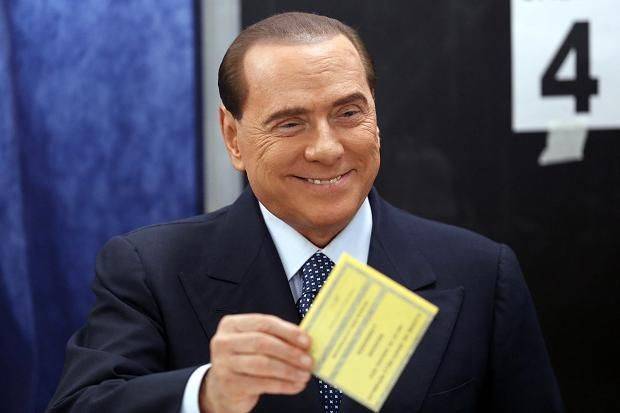Shock Waves from Italian Elections
ROME - Italy's national general election has generated shock waves worldwide, and from throughout Europe pleas call for stability and creation of a new government rather than recourse to new elections. The final results released today show a three-way split. The largest parties in Italy are represented, in order of size, by the protest voters inspired by Beppe Grillo (25.55%), the left-leaning pro-labor coalition of Pier Luigi Bersani (25.40%) and the center-right's coalition of former premier Silvio Berlusconi (21.56%). Trailing behind these was the moderate faction of outgoing Premier Mario Monti, with a fairly disappointing 10.54%.
The big three will call the shots when they meet in coming days with President Giorgio Napolitano, whose job it is to appoint a politician to attempt to form a new government. Who will head that government, what outside support it will have, and from whom, and what the splintering will mean for the future of governing, is anyone's guess. The initial shock reaction, reiterated around the globe and in the markets, was that Italy is at an impasse and risks being ungovernable. Many argue that new elections should be called, but this would make sense only after a careful revision of the present notoriously bizarre election law known as the Porcellum - the Hog Law.
In Italy itself, commentators have borrowed the phrase "Tsunami Tour", as actor-politician Beppe Grillo dubbed his dogged campaign, as a larger metaphor for the stunning results from the two days of national general elections Feb. 24-25. "Grillo's tsunami has smashed against the shores of Italy and left it in smithereens," said one. "The anomalous gigantic wave has washed over the Italian political system, which will never be the same again," intoned another. "Shipwreck in historical safe ports," as Federico Geremicca of La Stampa of Turin put it more indirectly. Investors in Italian banks voted with their pocketbooks today, and bank stocks sank 10% in a single morning.
Final results of the elections available Tuesday morning showed that Grillo's Movimento Cinque Stelle (M5S) is the single largest political party in Italy with 25.55% of the vote for the Chamber of Deputies. With 25.40%, Pier Luigi Bersani's Partito Democratico (PD), predicted to have the backing of one-third of the electorate, slipped behind Grillo, but, thanks to the Hog Law, the PD together with its coalition partner, Nichi Vendola, will prevail in Parliament. Under Hog Law terms, the winning coalition (that is, Bersani-Vendola together with 29.53%) automatically wins enough freebie members of Parliament to boost its total to 340 seats out of 630. Is this fair? Not particularly, but it is still the law, passed under then Premier Silvio Berlusconi.
And speaking of Berlusconi, and one must, many of us had given him up for lost in the meanders of scandal, from girlie gossip to trials over financial wheeling-dealing and allegations of Mafia connections. Moreover, his ever-present TV campaigning, enlivened by facelifts and view shifts, was overshadowed by the resignation of Pope Benedict the XVI, meaning that for days Berlusconi disappeared from the air waves and headlines. Could he possibly make a comeback? Yes indeed, and so he did, with his center-right coalition, which includes a delegation of Northern Leaguers, winning 29.13% of the Chamber of Deputies. Never mind that the spread widened as soon as his excellent showing became apparent: "We lived without the spread for years and can get along just fine without it," he said blithely today. Italians asking what rabbit had been pulled out of the Berlusconi hat are being told that it is called money: his promise to remove the austerity property tax imposed by Monti and to cut taxes.
In the Senate, where voters must be 25 years or older, the voting is uniquely strange. With some 42,272,000 eligible to vote, the turnout was of 31,751,000. The Italian Interior Ministry provided definitive results Tuesday evening for seats in the Chamber and in the Senate, quite different from the earlier projected Senate count. In the Chamber the Center-left will have 345 seats, thanks to the added freebies; the Center-right 125; Grillo's M5S 109 and Monti 47. The amended Senate count gives Bersani's Center-left 123 seats; the Center-right of Silvio Berlusconi 117; Grillo 54 and Monti 19.
In the Chamber, outgoing emergency Premier Mario Monti fared relatively poorly, with his three-party coalition claiming a total of 10.54% of the vote in the lower house, whereas pollsters had predicted they would reach 15%. Monti's own newborn party's portion amounted to only 8.3%, but his party and its partners remain an important swing vote. On the radical left, the list headed by magistrate Antonio Ingroia captured a mere 2.4% of the vote.
Looking ahead, Napolitano's own seven-year term ends in six weeks, and the new Parliament and Senate in joint session will elect his successor, to take office May 16. The first three votes are decided by a two-thirds majority; after that a simple majority is all that is required.


































i-Italy
Facebook
Google+
This work may not be reproduced, in whole or in part, without prior written permission.
Questo lavoro non può essere riprodotto, in tutto o in parte, senza permesso scritto.